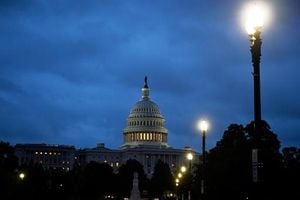Deputy Prime Minister Angela Rayner is under mounting pressure as the Conservative Party calls for a formal ethics investigation into her tax and housing arrangements, following revelations that she saved £40,000 in stamp duty on a seaside flat purchase by removing her name from the deeds of her family home. The controversy, which erupted on August 29, 2025, has prompted accusations of "hypocritical tax avoidance" and raised broader questions about ministerial standards, transparency, and the responsibilities of public office.
According to multiple reports, including coverage by The Telegraph and Bloomberg, Ms Rayner admitted to removing her name from the title deeds of her family house in Ashton-under-Lyne, Greater Manchester, shortly before buying a flat in Hove, East Sussex. This move allowed her to avoid the higher stamp duty surcharge typically levied on second homes, resulting in a payment of £30,000 instead of £70,000. At the same time, she maintained that her former home in Tameside remained her primary residence—a claim that has become the focal point of the dispute.
By declaring the Tameside property as her main home, Ms Rayner also avoided paying thousands in council tax on a third property, a grace-and-favour flat in Admiralty House, central London, where she resides during her ministerial duties. The Cabinet Office has confirmed that it has been covering her council tax bill for the official residence, stating that her liability "has been properly discharged." However, this arrangement has fueled criticism from political opponents, who argue that her statements on residency are inconsistent and potentially misleading.
The Conservative Party, led by its chairman Kevin Hollinrake, has formally referred the matter to Sir Laurie Magnus, the Prime Minister’s independent adviser on ministers’ interests. In a detailed letter dated August 29, 2025, Hollinrake accused Rayner of "hypocritical tax avoidance, by a Minister who supports higher taxes on family homes, high-value homes and second homes." He asserted, "She is paying second homes council tax to Brighton and Hove council on a property that she tells HMRC is not a second home. This may be lawful, but it is inappropriate tax avoidance for a Minister subject to higher standards of conduct."
Hollinrake’s letter, which has been made public, further contends that Rayner’s residency statements to various authorities are contradictory. He alleges that while she tells HMRC that her Hove flat is not a second home, she pays second homes council tax to Brighton and Hove council. Simultaneously, she tells the Cabinet Office that Tameside is her primary home, a claim he disputes, arguing, "She does not reside in this property." The Conservative Party has even written to the local Tameside council, requesting that Rayner be struck from the electoral register if the property is no longer her main residence.
Stamp duty, a tax levied in England and Northern Ireland on property purchases above a certain threshold, typically incurs a significant surcharge for second homes. By removing herself from the deeds of the Greater Manchester property before the Hove purchase, Rayner was able to sidestep this additional cost. The move, while not illegal, has been characterized by critics as "inappropriate tax avoidance" for a senior government official, especially one who serves as Housing Secretary and is responsible for overseeing council tax and housing policy.
In his letter to Sir Laurie Magnus, Hollinrake emphasized the gravity of the issue, noting, "This directly engages her conduct as a Minister. This is particularly acute given her Ministerial responsibilities for council tax, housing policy and electoral law." He called for a formal investigation under the Ministerial Code, suggesting that if a breach is found, sanctions could include a reprimand or the loss of her ministerial residence. Hollinrake also suggested that Rayner should recuse herself from all policy matters relating to taxation on second homes, given her "skin in the game."
Ms Rayner has not commented further since her admission on the evening of August 29, but her team has firmly rejected any suggestion of impropriety. In a statement provided to The Telegraph, her team insisted, "The Deputy Prime Minister paid the relevant duty owing on the purchase of the Hove property in line with relevant requirements and entirely properly. Any suggestion otherwise is entirely without basis." A Cabinet Office spokesperson added, "Ms Rayner has followed advice on the allocation of her official residence at all times."
According to reports, Rayner divorced her husband and ceased to own a stake in the Greater Manchester home some time ago, but she still considers it her primary residence because her children live there. This detail, while humanizing, has not quelled the political storm. The Conservative Party’s argument hinges on the principle that ministers should be held to the highest standards of conduct, particularly when their personal affairs intersect with their official responsibilities. Hollinrake wrote, "Ministers should recognise that as office-holders, they are held to the highest possible standards of proper conduct, and ensure that they are living up to those standards in their words and actions."
For her part, Rayner has consistently maintained that her Tameside house is her main home. Nevertheless, the optics of the situation—removing herself from the deeds to avoid a hefty tax bill while benefiting from taxpayer-funded council tax on a London flat—have fueled claims of double standards. The Cabinet Office’s confirmation that her council tax liability at Admiralty House "has been properly discharged" has done little to quiet critics, who argue that the discharge was based on potentially misleading residency declarations.
Sir Laurie Magnus, as the government’s independent ethics adviser, now faces the task of determining whether Rayner’s actions constitute a breach of the Ministerial Code. If he decides to open a full inquiry and finds that the code has been violated, possible sanctions range from a formal reprimand to stripping Rayner of her ministerial residence. The outcome could set a precedent for how similar cases are handled in the future and may influence public perceptions of accountability at the highest levels of government.
Observers note that while no laws appear to have been broken—Hollinrake himself conceded as much—the crux of the matter is whether Rayner’s actions meet the "higher standards" expected of ministers. The debate touches on broader issues of trust, transparency, and the sometimes-blurry line between legal compliance and ethical conduct in public life. As Housing Secretary, Rayner’s decisions carry weight not just for her own career, but for the policies that affect millions of Britons.
With the ball now in Sir Laurie Magnus’s court, Westminster watches closely. The coming days will reveal whether this controversy marks a fleeting political squall or the beginning of a more profound reckoning over ministerial ethics and public trust. For Rayner, the stakes could not be higher.





